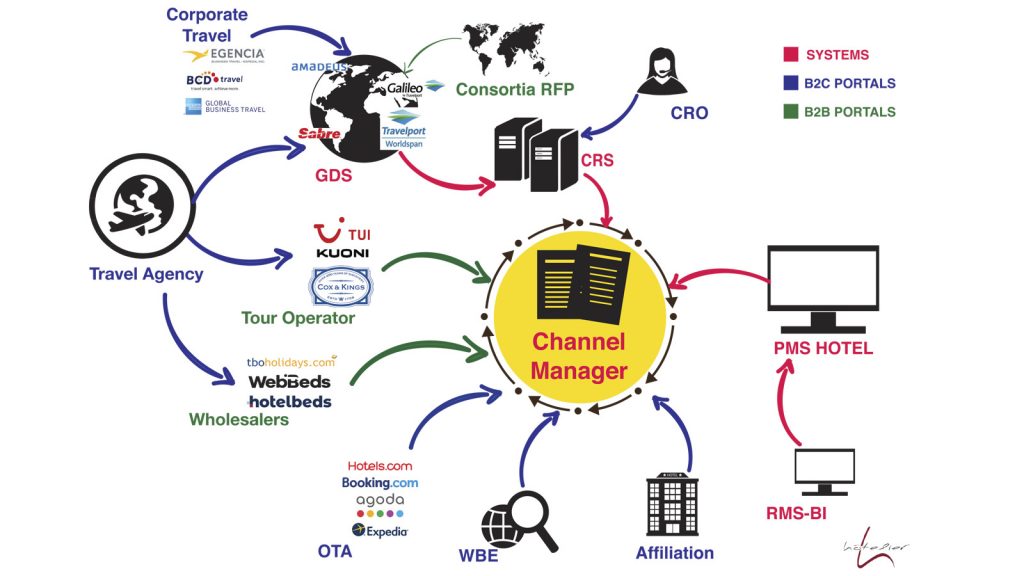Rate disparity might be a complex issue, but it can cause a customer to lose trust in your company and, as a result, impact your bottom line, which means ignoring it isn’t an option. Serge Chamelian, managing partner of h-hotelier, shows us the way, by explaining the different distribution channels from a practical perspective, and provides recommendations

Serge Chemelian, Managing Partner, h-hotelier
Nowadays, it is unusual to find rate disparity amongst the leading online travel agencies (OTAs), since most hotels work with a channel manager. The disparity most likely to arise occurs when a promotion is set on one individual distribution platform. In fact, most disparities takes place on the B2B platforms, mainly when wholesalers (B2Bs) supposed to sell on a B2B basis allow rates to be leaked by third-party OTAs (B2Cs), which then sell the wholesale rates to individuals. Moreover, these OTAs buying their rooms via the wholesalers might also cut into their own commissions to undercut a hotel’s rate as a way of attracting clients. Such activity has resulted in hotels offering different rates online without having any control over them. The problem has become so pronounced that one of the largest wholesalers – ‘hotelbeds’ – publicly announced recently that it had stopped working with booking sites which were breaking hotel distribution rules. The illustration below allows us to identify both types of customer groups – B2B and B2C – with a detailed definition of the terminology identifying the various distribution channels to help avoid confusion:
• GDS (B2B), or global distribution system providers, such as Galileo, Sabre and Amadeus, are large computer networks that pass hotel inventory and rates to travel agents and travel sites. Other travel segments, such as rental cars and airlines, also use them and they are additionally the main platform for the airline Industry.
• CRO (B2C), or the central reservation office, is a system that allows reservation agents to receive reservation requests by phone and to handle them immediately. CROs display availability of hotels and allow reservation agents to find a suitable property easily and quickly for a client they have on the phone.
• Consortia (B2B) are associations or marketing organizations which link together small-to-mediumsized independent travel agencies to leverage purchasing power and marketing opportunities. The consortia rate is negotiated between hotels and travel agencies and is only available to contracted consortia.
• WBE (B2C), or a web booking engine, is an online application which allows you to choose from a wide range of travel products, such as hotels, air tickets and conference halls, and book them on the internet. One main advantage of the WBE is that it provides easy access to payment processes and purchase systems.
• Wholesaler (B2B) is a company that operates as an intermediary between the travel product supplier and the retail travel agent in the marketplace, selling rooms in bulk.
• TA (B2C) or travel agents are licensed travel product retailers that provide travel information, reservations and other forms of assistance to consumers and groups in making travel arrangements.
• A channel manager is a cloud-based channel management solution that enables you to manage your online distribution with ease from one place. It provides a live, two-way connection to each of your OTAs with a unique, pooled inventory model.
• CRS (B2B), or central reservation system, is a type of reservation software used to update and maintain information about a hotel on its inventory and rates, so that properties are able to manage guest reservations and related processes in real time. These reservations are managed across a multitude of distribution channels, such as third-party booking websites, direct internet booking engines, the GDS, wholesalers and more. A CRS centralizes the data from the property management systems, distribution channels, call centers and phone reservation systems used across one or many properties. Rate disparity affects customers’ trust in your company and your bottom line. On the one hand, if rates on your own ‘Best Rate Guaranteed’ website are higher than those available on OTAs’ websites, customers might lose confidence in your firm and believe that OTAs are offering discounted prices. Equally importantly, when OTAs offer lower rates on their sites than your rate on the brand.com site, there is no incentive for customers to book directly with you, despite the fact that you are still paying commission to the agencies.
 To prevent or minimize rate disparity, it is critical that you monitor your rates across all of your distribution channels:
To prevent or minimize rate disparity, it is critical that you monitor your rates across all of your distribution channels:
• Seek the advice of hospitality professionals to identify a leakage
• Invest in technology that improves your administrative efficiency since rate disparity occurs due to human error
• Use this technology to keep track of your own daily rates, since you will want to make sure you comply with all of your distribution agreements
• Take ownership of the contracts for the B2B platforms
• Implement a channel manager to avoid forgetting to revise OTA rates during an update or accidentally leaving old rates on certain sites
• Offer slightly lower rates on your own website in order to increase direct bookings; perhaps giving the same rate, but with a supplement
h-hotelier.com
Add to Favorites 








 To prevent or minimize rate disparity, it is critical that you monitor your rates across all of your distribution channels:
To prevent or minimize rate disparity, it is critical that you monitor your rates across all of your distribution channels:





